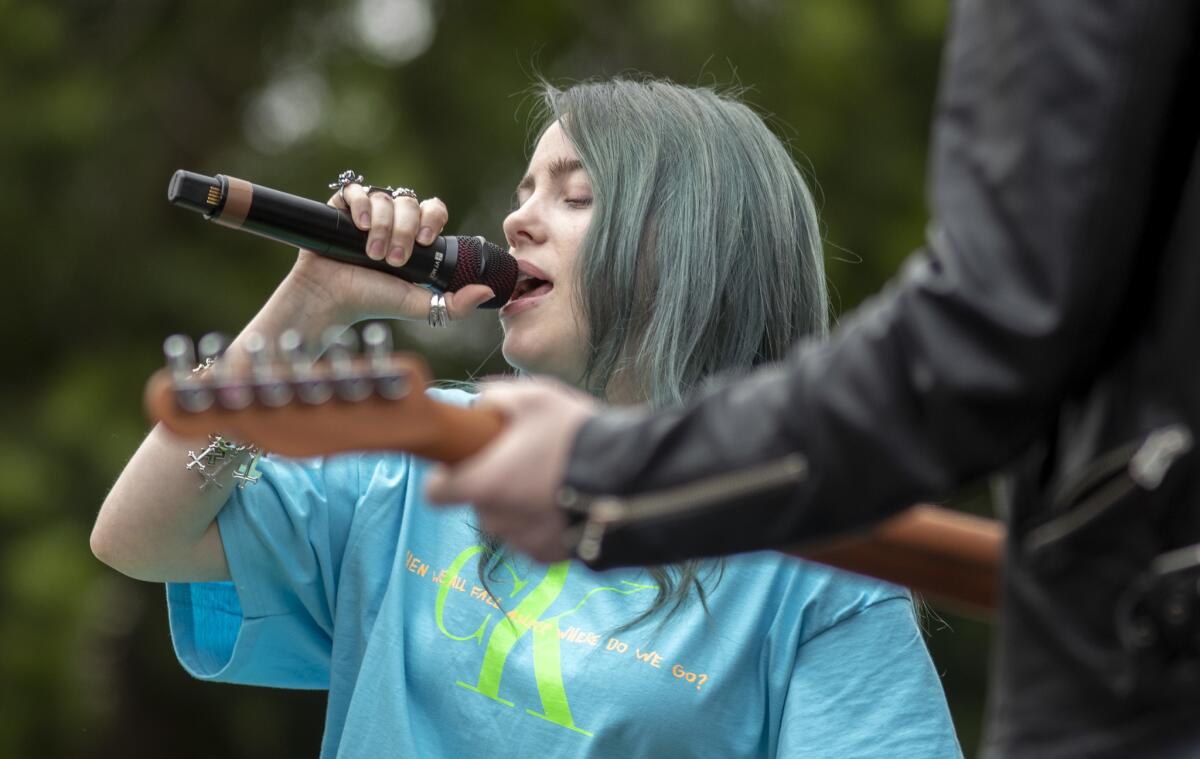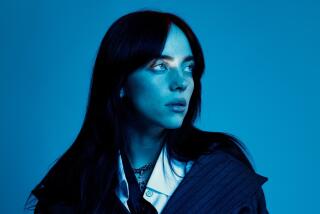Billie Eilish has a No. 1 album, a spot at Coachella and 3,000 autographs to sign

At 17 years old, Billie Eilish already owns her dream car: a matte-black Dodge Challenger that she pointed to with pride as it sat parked the other day in front of a Burbank rehearsal studio.
“Dude, I love it so much,” she said, squinting in the afternoon sun. “I’ve been obsessed with it since I was like 12.”
The problem? With a job that demands nearly every one of her waking hours, America’s newest pop star hasn’t found the time to secure her driver’s license yet.
Given the speed at which her career is moving, it figures that Eilish — whose learner’s permit, she clarified, allowed her to drive here with her mom as a watchful passenger — didn’t wait to be properly credentialed before acquiring the wheels she wanted.
After all, it was late 2015 when the singer, then 13, posted her debut single on SoundCloud, the do-it-yourself streaming platform.
Now, a mere 3½ years later, she has a No. 1 album — with the second-biggest opening of 2019, according to Billboard, behind Ariana Grande’s “Thank U, Next” — and a prime performance slot at this weekend’s Coachella festival in Indio.
In truth, Eilish’s rapid ascent has come with some help from the powers that be.
Interscope, which signed her at age 14, bought the Challenger last year for her birthday, she revealed somewhat sheepishly. And the major label has given a major push to her instant-smash album, “When We All Fall Asleep, Where Do We Go?”
Eilish is an increasingly rare example of the old-fashioned process known as artist development, in which a record company spends time and money — neither as plentiful as they used to be — cultivating an exceptional talent.
Yet the singer’s secret weapon is that her music doesn’t feel like a carefully honed product of that system.

Morbid but funny, tender yet wise, “When We All Fall Asleep” presents an idea of teen pop dramatically different from those embodied by the many young women who’ve come before her.
Her music addresses death and depression along with the promise (and the torment) of fresh romance; her songs put minimal beats under whispery vocals that never even approach Christina Aguilera-style belting.
And at a moment when rock has ceded its youth-culture prominence to hip-hop, Eilish describes the influence of dramatic guitar bands like Flyleaf, Hawthorne Heights and Nirvana — the last of whose Dave Grohl recently said that Eilish’s energy reminds him of Nirvana’s during the “Smells Like Teen Spirit” days.
Despite Interscope’s involvement, the singer comes across as someone adhering to an intensely personal vision, which has created an intimate bond between her and her fans.
“this album is the world to me please take care of it,” she wrote on Instagram when the record came out late last month.
Eilish made “When We All Fall Asleep” with her 21-year-old brother, Finneas, in their parents’ house in Highland Park; both kids were home-schooled by their parents, Maggie Baird and Patrick O’Connell, who worked as actors and encouraged the children to pursue their artistic passions.
In that spirit, Eilish learned to sing as a member of the Los Angeles Children’s Chorus, which is why she now has “no chest voice at all,” she said as she sat on a picnic bench outside the studio. She wore baggy pants and a lime-green shirt emblazoned with the name of a pet-supplies distributor; Baird, who travels with her daughter as a kind of guardian-assistant hybrid, set a large stack of photos on the table and asked her to sign them while we talked.
“I told the label there’s no way we’re going to get all 3,000 done,” Baird said. “But whatever.”

In her music and especially her videos, Eilish is drawn to unsettling imagery, as in the clip for her song “Bury a Friend,” in which disembodied hands poke needles into her back.
With a laugh, she said she’s “not trying to be Billie Eilish, the scary girl.” And indeed, along with the dark stuff, her album contains broadly comedic bits, including one song that samples “The Office.”
But part of her success — which follows that of such proudly moody artists as the Weeknd and Lana Del Rey — is connected to the way she uses her dead eyes to register her distaste for the shiny-happy customs of traditional pop stardom.
She provided a great example on last month’s televised iHeartRadio Music Awards when a camera found her unimpressedly sucking a lollipop as Halsey accepted a prize onstage.
“It looked like I was having the time of my life, right?” she asked me before saying that she’d also brought a Ring Pop and a Jolly Rancher to the show.
“I knew I was about to be bored out of my mind.”
The reaction shot underscored something else, which is how quickly pop moves today. At 24 years old, Halsey almost certainly intimidates the likes of Katy Perry and Justin Timberlake, who no longer speak to young listeners the way they once did. But here, in teenage Eilish, was someone to make even Halsey feel old. Eilish frowned at the thought.
“Everybody’s always trying to make everybody compete,” she said. “They’re like, ‘Billie’s album might pass Ariana’s…’ But just stop. I don’t care. I don’t want to hear that Billie Eilish is the new Lana Del Rey. Do not disrespect Lana like that! That woman has made her brand so perfect for her whole career and shouldn’t have to hear that.” She paused.
“I don’t want to hear that somebody’s the new Billie Eilish in a couple of years.”
Yet that’s how pop works, of course. And as skillfully as she’s diverged from a Britney Spears-style path, Eilish is still subject to the same laws of gravity that govern the form.
Which is why — in addition to tweeting and showing up on television and autographing (almost) 3,000 pictures of herself — Eilish is spending much of the rest of the year on the road, solidifying her audience city by city and concert by concert. In Los Angeles alone, she’ll play three gigs in July (at the Shrine Expo Hall and the Greek Theatre); all of them have already sold out.
In Burbank, as Finneas worked out an arrangement of “Wish You Were Gay” — about how a boy’s sexual orientation would make his rejection of Eilish less painful — the singer dropped her characteristic chill to admit that she was “mildly terrified” to be playing much of her new music live for the first time at Coachella.
Crowds in Southern California, she explained, “they’ve seen it all — and they’re all thinking, ‘I’ll be on that stage someday.’ It’s so aggravating.”
Surely Eilish was like that when she was younger.
“I wasn’t! Not at all. One of my biggest pet peeves is people who just assume they’re going to be famous.”
Why?
“Because it’s telling me that you think this is something that could just happen — that I’m not here because I worked hard.”
Eilish is proud of the effort she’s put into her music, though she says she’s struggled with professionalizing something that began for her as a form of therapy.
“It’s a gross feeling when the one thing that made you feel safe has been made into a job,” she said.
Her growing celebrity has also complicated her relationships.
“It’s hard to make friends when you can’t go out to lunch” without getting mobbed, she said. “I can invite someone over, but that’s giving them my address. They’ll see my car with my license plate. They could take a picture of me in my room while I’m changing and blackmail me.”
Even snapping a photo in public requires consideration of a person’s motives. “They could be posting a picture and tagging me because they like me,” she said. “But they could be using me too to get recognition.
“I can’t tell you how much I hate having to think about that. But I do have to.”
All of this makes it easy to understand why Eilish holds her family so close at an age when many are leaving the nest.
Occasionally she chafes at having her parents around, as any 17-year-old would. But other artists are always telling her how lucky she is, and she’s chosen to go along with that.
“Besides, it’s not like I can drive anywhere by myself,” she said with a laugh, referring to her nonexistent license.
“Though I should have it this month,” she added. “So don’t feel too sorry for me.”
Twitter: @mikaelwood
More to Read
The biggest entertainment stories
Get our big stories about Hollywood, film, television, music, arts, culture and more right in your inbox as soon as they publish.
You may occasionally receive promotional content from the Los Angeles Times.











